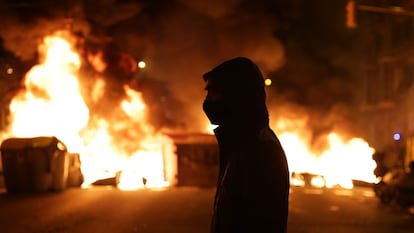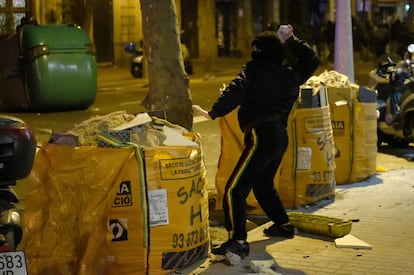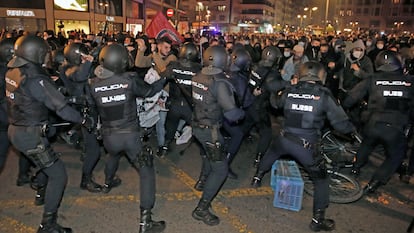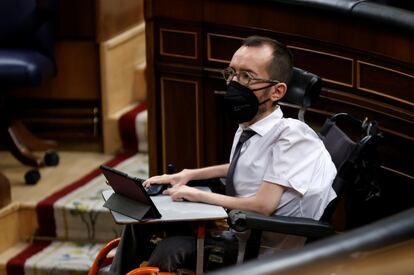Catalonia rocked by third night of protests over jailing of rapper Pablo Hasél
Riot police clashed with supporters of the musician, who was sentenced to prison for glorifying terrorism and insulting the monarchy on Twitter

Protesters took to the streets of Catalonia for a third night in a row on Thursday to demonstrate against the arrest of Spanish rapper Pablo Hasél, who was recently convicted of praising terrorism and insulting the Spanish Crown in messages on social media.
A court had refused to suspend Hasél’s nine-month sentence due to his criminal record, which includes convictions for assault and for writing songs that expressed admiration for terrorist acts. Catalan police arrested him on Tuesday after he refused to report to prison in Lleida.
The arrest sparked protests across Catalonia on Tuesday, which later spread to Madrid and Valencia. While the demonstrations began in support of freedom of speech, the ensuing clashes with police, in which a 19-year-old woman lost an eye, have also turned into a call against police repression.

Barcelona
In Barcelona, around 500 protesters clashed with police Thursday night outside the headquarters of the regional Interior department. Following the standoff, the demonstrators continued to march down the streets of the city. At around 8.30pm, the group passed the offices of the newspaper El Periódico de Catalunya, which are located at the crossroads between Sant Joan and Bailén streets. Some of the protesters smashed the windows of the building and spray-painted the front door, while others yelled against the “manipulative Spanish press.” At the time, around 30 people were inside the offices, according to El Periódico, which publishes separate daily editions in Spanish and Catalan.
La sede del @elperiodico_cat víctima de la ira de los participantes en manifestación #LibertadPabloHasel #Hasel #altercados #Barcelona #PabloHasel pic.twitter.com/tj9ysrslel
— Alfonso Congostrina (@alfcongostrina) February 18, 2021
“The headquarters of El Periódico de Catalunya, a victim of the protesters’ anger,” reads this tweet from EL PAÍS journalist Alfonso Congostrina.
At the crossroads of Aragón and Bailén streets, protesters created a barricade from trash containers taken from the center of the city, which they set on fire. The Catalan regional police, the Mossos d’Esquadra, crossed over the burning barricade, while residents poured water from the balconies of their homes. One journalist saved a car from being engulfed by the flames. The Mossos were able to rout the protesters from the barricade, but there were more incidents at other points in the city, with one police officer injured after being hit by stones.
According to police sources, there were fewer protesters in Barcelona on Thursday, compared to the other two nights, with participants falling from 4,500 on Tuesday and 1,700 on Wednesday. Barcelona’s security lieutenant, Albert Batlle, estimated on Friday that the three nights of protests have caused between €400,000 and €500,000 of damage.
Elsewhere in Catalonia
Other cities in Catalonia also saw similar unrest on Thursday. In Sabadell, “violent groups” threw “eggs, barricades and bottles” at officers in front of the headquarters of the National Police and also burned trash containers, according to the Catalan police force.
In Tarragona, more than 100 protesters blocked the A-7 ring road with trash containers. The tensest moment happened close to the campus of Rovira i Virgili university when a young protester tried to climb on top of a moving police vehicle. When the car did not stop, the protester fell to the ground and was badly injured, reports Marc Rovira.

In the first two days of protests in Catalonia, 51 people have been arrested, most of whom are aged between 16 and 25. Another 55 have required medical help, including 31 regional police officers. The most serious injury took place on Tuesday when a 19-year-old woman lost her eye in the clashes. In an interview, the woman said she was throwing objects at the police because she “was furious.” An investigation has been launched to determine whether she was hit by a foam projectile used by the Mossos.
Sources from the Mossos compared the street protests to the riots seen in 2019 in response to the Supreme Court ruling against Catalan separatist leaders involved in the 2017 breakaway bid. “There is an effort from some sectors to revive the spirit after the sentencing [of the Catalan pro-independence leaders],” said the sources.
At a press conference on Thursday, Mossos spokesperson Joan Carles Molinero described the protesters as “an amalgam of violent and aggressive people, who cause unrest with the pretext of a legal demonstration.”
Valencia
In Valencia, hundreds of people also took to the streets on Thursday in support of Hasél and to protest against the police’s response to the recent demonstrations. The protest was organized on social media under the slogan “we are fed up.” At around 7pm, the protesters – made up mostly of young people and students – gathered in the center of the city, where they clashed with riot police.

The demonstrators tipped over trash containers, blocked streets and yelled insults at officers. At least one person was injured and eight arrests were made. One protester hit the camera of a journalist from the local Valencian television channel À Punt. According to the Spanish news agency EFE, at one point during the demonstration, a protester read out a speech denouncing police repression and warning: “If they want a war, they will have a war.”
Government divide
The street protests have heightened tensions within the Spanish government, which is run by a coalition of the Socialist Party (PSOE) and their junior partner Unidas Podemos.
While the PSOE has loudly condemned the violence, the response from Unidas Podemos has been more timid. Indeed, Podemos’s spokesperson in Congress, Pablo Echenique, publicly supported the protesters in a message on Twitter. “All my support to the young anti-fascists who are calling for justice and freedom of expression in the streets,” he wrote on Wednesday.

The PSOE, however, has argued that the violent street protests have nothing to do with freedom of expression. At an event on Friday, Spanish Prime Minister Pedro Sánchez admitted that reforms were needed regarding free speech in Spain, but argued that such clashes were not the way forward. “In a full democracy, and Spain is a full democracy, violence of any kind is unacceptable,” he said. “Because that is not freedom, it is an attack on the freedom of others.”
In a radio interview with the Cadena SER radio network on Friday, Guillermo Fernández Vara, the PSOE premier of Extremadura, summed up the differences within the coalition: “There is a party that is trying to govern and another that is trying for there to be no government.”
The Spanish Justice Ministry, run by the PSOE, has promised to reform the criminal code to end prison sentences for crimes involving freedom of speech, specifically in the case of offending religious feelings and glorifying terrorism. But Unidas Podemos wants to eliminate these offenses altogether.
Madrid regional premier Isabel Díaz Ayuso and the mayor of the Spanish capital José Luis Martínez-Almeida, both of the conservative Popular Party (PP), on Thursday asked the government to dismiss Deputy PM Pablo Iglesias of Unidas Podemos, accusing him of “inciting violence.”
What was Hasél convicted of?
Hasél’s conviction for glorifying terrorism and insulting the Crown is based on 64 messages he published on Twitter between 2014 and 2016 and a song he shared on YouTube. In one message from March 2016, he posted a photograph of Victoria Gómez, a member of a left-wing terrorist group named GRAPO, with the message: “Demonstrations are necessary but not enough. Let us support those who took things further.” In the case of the song, the lyrics included phrases such as “the poor go to prison but not the [king’s sister] Infanta Cristina, although half the country wants her to get the guillotine.”
Hasél, whose real name is Pablo Rivadulla Duro, was sentenced in March 2018 to a prison term of two years and one day, but an appeals judge later reduced the sentence to nine months and one day because his messages did “not pose a real risk” to anyone. This decision was ultimately upheld by the Supreme Court in May 2020.
On Thursday, the Lleida High Court upheld another conviction against Hasél. In this case, the rapper was sentenced to two-and-a-half years in prison for obstruction of justice for threatening a witness during a trial of two police officers. On October 18, 2017, the rapper asked a court witness: “Are you a friend of the Urbanos [the city police force]? Have you seen what you’ve done?” When he tried to kick the man, several people rushed to keep the two apart. The rapper then told the man: “I will kill you, son of a bitch, I will get you.” This sentence can still be appealed to the Supreme Court.
Before this most recent conviction, Hasél had been previously sentenced to prison on several occasions for crimes that include assaulting a journalist in 2016. In March 2015, he received another two-year prison sentence for writing and sharing songs that praised attacks carried out by terrorist groups such as the now-defunct Basque group ETA and Al-Qaeda, although he never served the jail term. This led judges to dismiss his petition to have the new prison term suspended as well. “Neither the convict’s personal circumstances, nor the nature of the facts, nor his behavior make him deserving of such a benefit,” said the High Court judges.
English version by Melissa Kitson.
Tu suscripción se está usando en otro dispositivo
¿Quieres añadir otro usuario a tu suscripción?
Si continúas leyendo en este dispositivo, no se podrá leer en el otro.
FlechaTu suscripción se está usando en otro dispositivo y solo puedes acceder a EL PAÍS desde un dispositivo a la vez.
Si quieres compartir tu cuenta, cambia tu suscripción a la modalidad Premium, así podrás añadir otro usuario. Cada uno accederá con su propia cuenta de email, lo que os permitirá personalizar vuestra experiencia en EL PAÍS.
¿Tienes una suscripción de empresa? Accede aquí para contratar más cuentas.
En el caso de no saber quién está usando tu cuenta, te recomendamos cambiar tu contraseña aquí.
Si decides continuar compartiendo tu cuenta, este mensaje se mostrará en tu dispositivo y en el de la otra persona que está usando tu cuenta de forma indefinida, afectando a tu experiencia de lectura. Puedes consultar aquí los términos y condiciones de la suscripción digital.








































